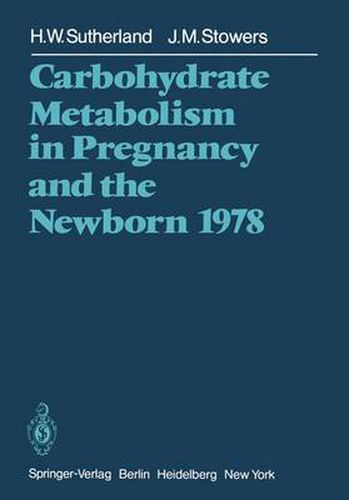Readings Newsletter
Become a Readings Member to make your shopping experience even easier.
Sign in or sign up for free!
You’re not far away from qualifying for FREE standard shipping within Australia
You’ve qualified for FREE standard shipping within Australia
The cart is loading…






This title is printed to order. This book may have been self-published. If so, we cannot guarantee the quality of the content. In the main most books will have gone through the editing process however some may not. We therefore suggest that you be aware of this before ordering this book. If in doubt check either the author or publisher’s details as we are unable to accept any returns unless they are faulty. Please contact us if you have any questions.
It has been our privilege to edit this volume which is complementary to the first book on Carbohydrate Metabolism in Pregnancy and the Newborn and which is based on work presented at the 2nd Aberdeen Colloquium bearing the same title held in April, 1978. The growth of knowledge of this subject in the 5-year period since the 1st Aber- deen Colloquium in 1973 is truly remarkable and fully justifies this second exposition of current ideas in this field at the present time. For example, the 1973 meeting failed to cover such recent to- pics as H. L. A. typing, glycosylated haemoglobin, control of glycae- mia in labour with the use of the artificial pancreas, fetal brea- thing and pregnancy specific B-glycoprotein and this volume provi- des such an opportunity. The scope of this book is broader and in- cludes data on placenta and fetal congenital anomaly related to ma- ternal diabetes and many aspects of birthweight while there is also a section on maternal weight and nutrition in pregnancy. In a wider prospective one of the stimuli for such work has been the impetus given by the regular meetings starting in 1969 of the Diabetic Preg- nancy Study Group of the European Association for the Study of Dia- betes. This has allowed much more effective integration of research on diabetic pregnancy. The work of the members of the Diabetic Preg- nency Study Group is widely represented in this publication.
$9.00 standard shipping within Australia
FREE standard shipping within Australia for orders over $100.00
Express & International shipping calculated at checkout
This title is printed to order. This book may have been self-published. If so, we cannot guarantee the quality of the content. In the main most books will have gone through the editing process however some may not. We therefore suggest that you be aware of this before ordering this book. If in doubt check either the author or publisher’s details as we are unable to accept any returns unless they are faulty. Please contact us if you have any questions.
It has been our privilege to edit this volume which is complementary to the first book on Carbohydrate Metabolism in Pregnancy and the Newborn and which is based on work presented at the 2nd Aberdeen Colloquium bearing the same title held in April, 1978. The growth of knowledge of this subject in the 5-year period since the 1st Aber- deen Colloquium in 1973 is truly remarkable and fully justifies this second exposition of current ideas in this field at the present time. For example, the 1973 meeting failed to cover such recent to- pics as H. L. A. typing, glycosylated haemoglobin, control of glycae- mia in labour with the use of the artificial pancreas, fetal brea- thing and pregnancy specific B-glycoprotein and this volume provi- des such an opportunity. The scope of this book is broader and in- cludes data on placenta and fetal congenital anomaly related to ma- ternal diabetes and many aspects of birthweight while there is also a section on maternal weight and nutrition in pregnancy. In a wider prospective one of the stimuli for such work has been the impetus given by the regular meetings starting in 1969 of the Diabetic Preg- nancy Study Group of the European Association for the Study of Dia- betes. This has allowed much more effective integration of research on diabetic pregnancy. The work of the members of the Diabetic Preg- nency Study Group is widely represented in this publication.